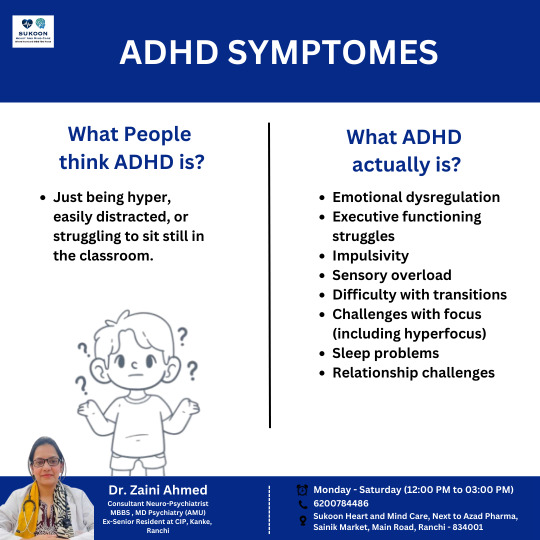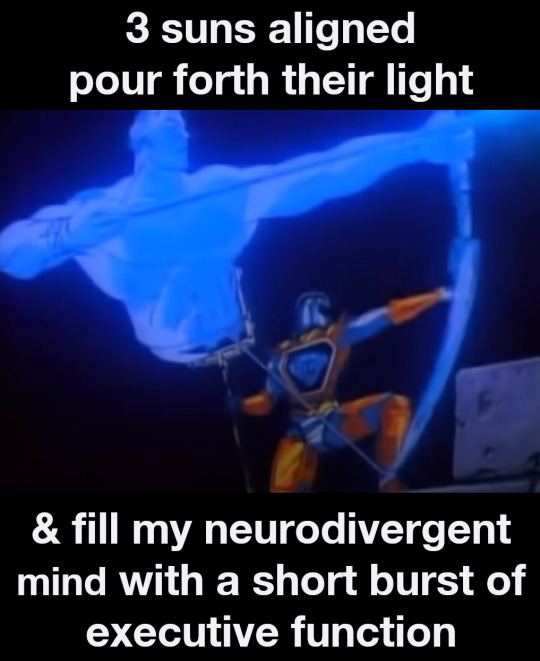#executivefunction
Explore tagged Tumblr posts
Text
Understanding ADHD Symptoms: More Than Just Hyperactivity

Many people assume that Attention-Deficit/Hyperactivity Disorder (ADHD) is simply about being hyperactive, easily distracted, or struggling to sit still in a classroom. However, ADHD is a complex neurodevelopmental condition that affects various aspects of daily life.
What ADHD Actually Is:
ADHD goes far beyond just being restless or inattentive. It impacts emotional regulation, cognitive functioning, and social interactions. Some key symptoms include:
Emotional Dysregulation: Individuals with ADHD often experience intense emotions and may struggle to manage frustration, anxiety, or excitement.
Executive Functioning Struggles: Difficulties in organizing tasks, prioritizing responsibilities, and managing time effectively.
Impulsivity: Acting without thinking, interrupting conversations, or making hasty decisions without considering the consequences.
Sensory Overload: Overreacting to stimuli like bright lights, loud noises, or textures, leading to discomfort or distress.
Difficulty with Transitions: Struggling to shift focus from one activity to another, making changes in routine challenging.
Challenges with Focus (Including Hyperfocus): While distraction is common, some individuals hyperfocus on specific tasks to the extent that they lose track of time.
Sleep Problems: Trouble falling asleep, staying asleep, or maintaining a consistent sleep schedule.
Relationship Challenges: Difficulties in maintaining friendships or professional relationships due to impulsive behavior or emotional dysregulation.
Seeking Help for ADHD
Understanding ADHD can help individuals and families find effective strategies for managing symptoms. If you or a loved one is experiencing challenges related to ADHD, professional consultation can provide guidance and support.
Dr. Zaini Ahmed, MBBS, MD (Psychiatry), specializes in neuropsychiatric conditions, including ADHD. She is available for consultations at Sukoon Heart and Mind Care, Sainik Market, Main Road, Ranchi, Jharkhand: 834001 from Monday to Saturday, 12 PM to 3 PM. To schedule an appointment, contact 6200784486.
Recognizing ADHD as a multidimensional condition is essential for offering the right support and treatment. Awareness and early intervention can significantly improve the quality of life for individuals with ADHD and their families.
#ADHD#ADHDAwareness#MentalHealthMatters#Neurodiversity#ADHDStruggles#ExecutiveFunction#FocusMatters#Impulsivity#SensoryOverload#EmotionalRegulation#Psychiatry#MindHealth#ADHDinAdults#MentalWellness#ADHDCommunity#DrZainiAhmed#bestpsychiatrist#bestpsychiatristinranchi#Ranchi#neuropsychiatrist
2 notes
·
View notes
Text

It do be like this though sadly 😅♾
#ActuallyAutistic #ADHD #AuDHD #neurodivergent #neurodivergence #ExecutiveFunction #Visionaries #meme #memes


#ActuallyAutistic#ADHD#AuDHD#neurodivergent#neurodivergence#ExecutiveFunction#Visionaries#Visionaries Knights Of The Magical Light#meme#memes
10 notes
·
View notes
Text
youtube
How ADHD Affects Prioritization (And Why Recognizing IBNUs Can Help)
How to ADHD Prioritization is hard! Recognizing IBNUs can help. So can Sunsama! Start your 14 day free trial here (no credit card required!): https://www.sunsama.com/a/howtoadhd Thank you so much for watching, commenting, sharing and being generally awesome to each other. I appreciate you so much! Support us on Patreon: http://patreon.com/howtoadhd Check out our website:…
View On WordPress
#actually neurodivergent#ADHD#adhdbrain#affiliatelink#Educational#executivedysfunction#executivefunction#how to adhd#howtoadhd#ibnu#importan#important#importantbutnoturgent#Neurodivergence#neurodivergent#neurodiversity#noturgentandnotimportant#prioritization#sunsama#terms#uai#ubni#urgent#urgentandimportant#urgentbutnotimportant#video#Videos#Youtube
2 notes
·
View notes
Text
Why the “Under 25” rule? It’s biological — not ageism
Brain development doesn’t end in your teens
Research shows that the prefrontal cortex — responsible for
impulse control,
long-term planning,
logical reasoning
— continues maturing well into the mid-twenties. Studies using neuroimaging and behavioral tests consistently note that full executive function (e.g., inhibiting impulsive behavior, organizing tasks, and controlling emotions) isn’t reliably established until around age 25.
Why does that matter for meaningful conversations?
Before this final stage of prefrontal development, people are naturally more susceptible to
strong emotional reactions,
less able to process complex, nuanced arguments.
That can lead to fiery, less constructive debates — rather than balanced, thoughtful discourse.
Bottom Line
The “Under 25” guideline is rooted in well-documented brain science — it’s a checkpoint for cognitive maturity, not a judgment on anyone’s value. The research is clear:
Executive functions (planning, inhibition, organization) climb well into the twenties.
Prefrontal control over emotions also matures later, meaning younger brains are wired for less regulated responses.
References
Luna et al., “Maturation of cognitive processes from late childhood to adulthood.” Child Development��— charts executive function development across ages (1, 2, 3).
Laurence Steinberg, “Teenage rebellion” (Temple University) — documents prefrontal maturation continuing into mid‑twenties (1, 2, 3).
#neurodevelopment#brainmaturity#executivefunction#prefrontalcortex#digitaldiscourse#cognitivegrowth#frontallobes#neuroscience#mentalhealth#developmentalpsychology#neurofacts#onlineetiquette#brainscience#generationalgap#maturitymatters#maturity#brain
0 notes
Video
ADHD & Cognitive Flexibility: Unlock Your Adaptive Superpower!
0 notes
Text
Effective Strategies for Managing Time Blindness
If you often find yourself losing track of time, you may be experiencing what’s known as time blindness - a common challenge for those with ADHD.

In a recent article from ADDitude Magazine, Losing Track of Time? 8 Ways to End ADHD Time Blindness, Mareen Dennis, MS LPP, shares eight valuable strategies for managing time blindness, organized under the “ACCURATE” acronym. To give you a quick, actionable summary, I've condensed her insights into five tips that can help you stay on track and regain control of your time:
1. Set Alarms and Use Clocks: Alarms can be used to remind you of tasks and transitions. Keep clocks or other time-tracking tools in sight to help you stay mindful of the time as you move through your day. 2. Create a Visual Schedule: Design a schedule that includes engaging, easy-to-read visuals. This can provide a quick reference point and help you stay organized and on track. 3. Break Tasks into Smaller Chunks: By breaking larger tasks into smaller, more manageable steps, you’ll be able to stay focused and make steady progress without feeling swamped. 4. Establish a Routine: A predictable routine helps you better understand how long tasks will take, making your day more structured and manageable. Consistency can significantly reduce the stress of uncertainty. 5. Make Time-Tracking Fun: Use familiar activities - like songs, TV shows, or movies - as benchmarks for estimating time. You can also try the "estimation game," where you predict how long a task will take and compare your guess to the actual time spent to help you improve your estimation abilities in the future (Dennis, 2024).
By incorporating these strategies into your routine, you can take meaningful steps toward improving your time management skills. Time blindness doesn’t have to dictate how you live your life. With the right tools and mindset, you can overcome it and take charge of your time.
Explore the Empowerment Through Understanding: Adult ADHD and Autism Modules here for additional insights and practical strategies to help you thrive! I also encourage you to download the AuDHD Strong app - which offers research-backed tools to help you improve executive functioning and better manage stress - and the Faces of Health app - which teaches mental health and stress management skills through short, educational videos.
Download AuDHD Strong now from the Apple Store or the Google Play Store. And Download Faces of Health now from the Apple Store or the Google Play Store.
For more valuable insights, I encourage you to explore my blog at https://drblied.com/blog/. For a selection of wellness resources, please visit the resources page on my website at https://drblied.com/resources/.
Reference
Dennis, M. (2024). Losing track of time? 8 ways to end ADHD time blindness. ADDitude Magazine. https://www.additudemag.com/losing-track-of-time-adhd/?ecd=wnl_additude_241210_cons_adhd_adult&goal=0_d9446392d6-e1442b1ddb-302800373
#ADHD#ADHDSupport#TimeBlindness#Neurodiversity#Neurodivergent#ADHDLife#TimeManagement#ADHDTips#ADHDCommunity#ADHDStruggles#ADHDawareness#ExecutiveFunction#ADHDSupportCommunity#MentalHealthMatters#TimeTracking#RoutineBuilding#ADHDSuccess#Psychologist
0 notes
Text
🚫 The Independence Myth 🚫
Parents, feeling like you need to do it all for them? Want to empower your student without overwhelming them? An executive function coach strikes the perfect balance of support and independence. 🧠 As one professor puts it, 'Students need to learn autonomy to thrive.' Hear it directly from our students (included testimonial) and discover how EF coaching can help your student succeed in college!
0 notes
Text
Exploring the Cultural Significance of Teaching Arabic as a Second Language
As globalization accelerates and interactions among individuals from various cultural and linguistic backgrounds become more frequent, it is essential to consider how we can cultivate a sense of intercultural appreciation and respect within our younger generations.

#executivefunction#skills#children#balancingwork#parents#academic#socialinteraction#personalgrowth#achievementunlocked
0 notes
Text

Our latest publication represents an ongoing collaboration with colleagues at National Taiwan Normal University, Taipei and National Taipei University of Nursing and Health Sciences, Taipei.
The work examines how acute concurrent exercise training influences executive function. The findings suggest that blood lactate is a mediator of the effects of acute exercise on executive function. This mediation effect is evident from a behavioural, but not neuro-electric standpoint.
Download a copy of the article from https://www.sciencedirect.com/science/article/pii/S1469029223001553?dgcid=coauthor
#exercise#workout#physicalactivity#executivefunction#electroencephalography#eeg#neuroscience#research#experiment#health
0 notes
Text

#procrastination#puttingthingsoff#laterlater#laziness#avoidance#busyness#stress#overwhelm#perfectionism#self-doubt#lackofmotivation#executivefunctioning#adhd#mentalhealth
14 notes
·
View notes
Text
youtube
ADHD-Friendly House Hacks - Feat. Caroline Maguire's home! (Executive Function Friendly Tips)
How to ADHD Skylight Calendar can give you peace of mind and time to enjoy the things you love by organizing your busy household! Go to https://skylightcal.com/HOWTOADHD and use my code HOWTOADHD for 10% off! Thanks, Skylight for sponsoring today’s video! Support us on Patreon: http://patreon.com/howtoadhd Buy my book!! https://howtoadhdbook.com Check out our website:…
View On WordPress
#ADHD#adhdbrain#adhdfriendly#adhdfriendlyhousehacks#adhdfriendlyischildfriendly#affiliatelink#automation#autopay#carolinemaguire#childfriendly#easyaccess#Educational#executivedysfunction#executivefunction#friendlytips#househacks#how to adhd#howtoadhd#ibnu#inventorymanagement#labels#launchpads#lifehacks#Neurodivergence#neurodivergent#neurodiversity#pointofperformance#skylightcalendar#video#Videos
0 notes
Text
EXECUTIVE FUNCTIONING, PUBERTY AND AUTISM
-Triveni Goswami Vernal(Registered Special Educator A64010)Executive Functioning skills refer to mental processes that help an individual solve problems, plan, initiate and execute actions. It includes three main components:a) Working Memory: It refers to a memory system that can hold on to information for a short span of time, for the completion of a cognitive task. It is different from short…

View On WordPress
0 notes
Text
How a Mild Head Injury Can Cause Long-Term Cognitive Issues
Let's dive into a surprising topic that hardly anyone talks about. You know those memory issues and executive functioning problems you’ve been experiencing? Maybe you’ve even wondered about ADHD... Well, what if I told you they might be linked to a head injury from your past?

Connecting the Dots: My Unexpected Journey
You might think a head injury big enough to cause such problems would be pretty memorable, right? Well, let me share my story to show how this connection can be missed for years.
Back in the day, I was a bright student, always at the top of my class. But as my exams approached, something strange started happening to my brain. I began experiencing difficulties I couldn't explain. Concentration issues, memory issues, zoning out, depression, severe fatigue, times when my brain just “went offline”. Despite my struggles, I passed most of my exams, but my life became a rollercoaster of success and failure.
Eventually, I was diagnosed with ME, ADHD, and bipolar disorder. I thought I was just genetically unlucky, stuck with a bad hand of cards. But then, last year, I stumbled on some information that changed everything. I discovered that all these conditions can be triggered by even a mild head injury.
Suddenly, it all made sense. I remembered a blow to the head I had right around the time I began struggling. Could that seemingly minor incident have set off a chain reaction that led to my diagnoses? It was a revelation that connected the dots in a way I never imagined.
The Emotional Rollercoaster
The struggles overshadowed my life. Praised for my intelligence and told I would go far, my self-esteem plummeted as I failed to meet expectations. Starting my A-level studies, I was on track to study medicine, but I barely scraped through my exams. It was frustrating because I knew my intelligence was still there; I just couldn't use my brain properly. This worsened my ME and depression, and so chronic pain became a daily burden.

Realising that all my struggles likely stemmed from that split-second head injury was a lightbulb moment. It gave me an explanation and freed me from the guilt of "not trying hard enough." Not living up to my potential and making my parents proud weighed heavily on me. But now, I see it wasn't a character flaw—it was trauma that had disrupted my neurons enough to change my life.
Unmasking the Hidden Effects of Mild TBI
Did you know that even a mild traumatic brain injury (TBI) can have long-term effects on cognition? It's wild, but even a minor blow to the head can cause significant issues with memory, attention, and executive function. For someone going through this, it might mean forgetting important dates or tasks, struggling to focus on work or studies, and finding it hard to plan or organize daily activities. These cognitive difficulties can stick around for months or even years, leaving people feeling frustrated and confused about their mental fog and reduced efficiency.
Living with the long-term effects of a mild TBI can make everyday life a constant challenge. You might find yourself unable to multitask like you used to or needing more time to complete simple tasks. Social interactions can also become tough, as keeping up with conversations or remembering names and details gets harder. This can lead to feelings of isolation and anxiety since the invisible nature of these cognitive struggles makes it hard for others to grasp what you're going through.

Looking Back: Could a Childhood Injury Be the Cause?
Think back to your childhood. Do you remember ever having a head injury or a bump, even if it wasn't severe enough to be treated in the hospital? My own injury occurred during cheerleading when I fell off someone's shoulders and hit the floor. But for you it could have been a fall off your bike, a sports injury, or even a playful accident that seemed harmless at the time.
Try to recall if your symptoms have always been present or if, like me, they started around that time. It's important to note that it can take up to 18 months for symptoms of a mild TBI to fully manifest. So, what might have seemed like a small incident could actually be the root cause of ongoing issues you're experiencing now.
Don't Go It Alone: Seeking Professional Help
Lastly, checking in with your doctor is always a good idea. They can help you explore the connection between your symptoms and any past head injuries and may offer further support or treatments. It's never too late to seek help and find ways to improve your quality of life.
Connect with Our Community
If this resonates with you, join our Facebook group! It's a chill space where we share stories, tips, and support each other. Click the link and come hang out with us. We'd love to have you!

If you think you’re dealing with something similar, don’t worry—I’ve got you covered! I have tons of tips and advice to help ease the long-term effects of TBI. From memory tricks to managing executive function struggles, I’ve been through it all and found ways to make life a bit easier. Stick around, and I’ll share what I’ve learned to help take some of the pain out of your journey.
Did this post give you any "aha" moments? I'd love to hear about it! Leave your thoughts in the comments below. Sharing your experiences and insights can help others on their journey too. Let's get the conversation started!
#BrainBumpBuddies#CognitiveQuirks#HeadInjuryAwareness#MentalHealthMatters#BrainHealth#ADHDAwareness#MemoryIssues#ExecutiveFunctioning#TBIRecovery#BrainFog#Mindfulness#WellnessJourney#SupportGroup#InjuryRecovery#MentalWellbeing#HealthCommunity#OvercomingObstacles#InvisibleIllness#Neurodiversity#SelfCare#HealingJourney#LifeAfterInjury#PersonalGrowth#Resilience#MentalResilience
0 notes
Text
Strategies for Building Lasting Habits
Building lasting habits and improving executive function is all about creating systems that work with your strengths.

In a recent article from ADDitude Magazine,How to Forge Stick-with-It Habits, Peg Dawson, EdD, shares valuable strategies to use executive functioning skills and build good habits. Here are a few quick tips, inspired by her article, to help you get started:
1. Use External Reminders to Ease Memory Load: Leverage tools like phone alarms, sticky notes, or calendars to help you remember tasks. These external reminders reduce mental strain and free up your memory for other important things. 2. Start Small and Build Momentum: Begin with simple, achievable goals (i.e., a daily 10-minute walk if you're aiming to exercise more). This allows you to build consistency and gain momentum over time. 3. Make It Easy to Get Started: Remove obstacles to getting started. For example, if you want to read more, keep your book on your nightstand to make it easy to pick up before bed. 4. Track and Celebrate Progress: Recognize your small victories and reward yourself along the way. Monitoring your progress reinforces positive behavior and boosts motivation.
While forming habits, it is important to implement strategies to conserve energy rather than relying solely on willpower. For example, minimizing distractions—such as silencing your phone or using noise-canceling headphones—can help you stay focused. Designating separate spaces for work, relaxation, and hobbies allows your mind to easily associate each area with its purpose, making it easier to concentrate. Additionally, partnering with someone for accountability can offer valuable motivation and support.
By applying these strategies, you can begin building healthy habits that support long-term success.
I also encourage you to explore these tools to promote your well-being:
Empowerment Through Understanding Modules: Dive deeper into ADHD and Autism with this online course to improve self-awareness, self-advocacy, and personal growth. Learn more here.
AuDHD Strong App: A helpful app for neurodivergent individuals with tools for organization, task management, and self-care. Download it today from the App Store or the Google Play Store!
Faces of Health App: This app offers valuable mental health and well-being resources. Download it today from the App Store or the Google Play Store!
For more valuable insights, I encourage you to explore my blog at https://drblied.com/blog/. For a selection of wellness resources, please visit the resources page on my website at https://drblied.com/resources/.
Reference
Dawson, P. (2025). How to forge stick-with-it habits. ADDitude Magazine. https://www.additudemag.com/building-healthy-habits-executive-functioning-skills-adhd/
#HabitBuilding#ADHDSupport#ExecutiveFunctioning#Motivation#ADHDSuccess#PositiveChange#DrBlied#MentalHealth#Psychology#TherapySkills#Education#Neurodivergent#Neurospicy#Neurodiverse#ADHD#Autism#AuDHD#ForYou
2 notes
·
View notes
Text
😓 Frustrated by Your Child’s School Portal? We Understand. 😓
You log into the school portal, hoping for good news, but instead, you're met with missed assignments and low grades. It’s disheartening and stressful, leaving you wondering how to help your child succeed.
🌟 At Connected Pathways Coaching, we specialize in turning these moments of frustration into opportunities for growth and success. Our trained Executive Function coaches help develop essential cognitive skills such as organization, time management, and emotional regulation to enhance their academic and life success. The skills your child needs to thrive.
👩🏫 Our Approach:
Expert Training: Each coach completes a comprehensive 30-hour EF course.
Personalized Plans: Tailored strategies to meet your child’s unique needs.
Proven Success: Techniques that work both at home and in school.
Imagine seeing improvements in organization, time management, and overall academic performance. Let us help you transform disappointment into progress.
Contact us today at [email protected] to learn more about how we can support your child's journey to success.
0 notes
Text
PolSky's "Executive Functions" is a Genre-Bending Masterpiece PolSky is a band that has always defied expectations. Their music is a genre-bending mix of indie, pop, rock, and electro influences. Their latest LP, "Executive Functions", is no exception. The album is a masterpiece that seamlessly blends these different genres into something entirely new. The album opens with the urgent dancefloor banger "Switchboard operator". The song is a perfect introduction to PolSky's sound, with its catchy melody, driving beat, and socially conscious lyrics. The album continues with a string of other standout tracks, including the anthemic "100 Million Ways To Die", the caustic social commentary of "Apocalypse now – (Ode to Cracky)", and the introspective ballad "In Love At The Cinema". Each song on "Executive Functions" is a unique and well-crafted piece of music. The album is full of surprises, from the unexpected ska influences in "Rainbow Road" to the lush orchestral arrangements of "Nimbus Cumulus". The album is a perfect blend of old and new. PolSky draws inspiration from a wide range of musical genres, from classic rock to modern electronica. The result is an album that sounds both fresh and familiar. The album is full of catchy melodies and driving beats. PolSky knows how to write a song that will get stuck in your head. https://www.musicarenagh.com/polsky-shares-the-fear-of-the-unknown-in-new-single-song-for-the-silver-surfer/ The production on the album is top-notch. The sound is crisp and clear, and the instruments are all mixed perfectly. The lyrics are clever and thought-provoking. PolSky tackles a wide range of topics on the album, from social issues to personal relationships. The vocals are strong and emotive. The band members all have great voices, and they use them to great effect on the album. Overall, "Executive Functions" is a fantastic album. It is a genre-bending masterpiece that is sure to appeal to fans of a wide range of music. I highly recommend it. The album is thought-provoking and introspective. PolSky doesn't shy away from tackling difficult topics, but they do so in a way that is both engaging and accessible. I highly recommend "Executive Functions" to anyone who enjoys music that is both challenging and rewarding. It is an album that will stay with you long after you finish listening to it. Listen to Executive Functions below Follow Polsky on Facebook Spotify Bandcamp Youtube Instagram
#Music#ALTROCKPOP#ANTHEMIC#DANCE#DREAMPOP#DRUMNBASS#EXECUTIVEFUNCTIONS#EXECUTIVEFUNCTIONSLATEST#EXECUTIVEFUNCTIONSLP#EXECUTIVEFUNCTIONSLPBYPOLSKY#GuitarDreamyMellowVibes#INDIEPOP#JUNGLE#LP#LPEXECUTIVEFUNCTIONS#POLSYEXECUTIVEFUNCTIONSLP#ROCKPOP#SOFTROCK#SUPERCATCHY#SUPEREDGY#UKBASED#WORKOUT
0 notes